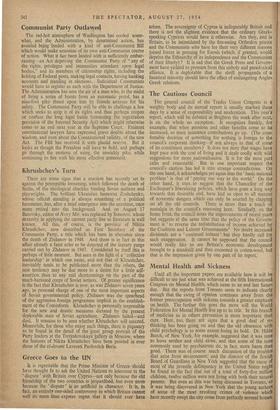There are some signs that a reaction has recently set
in against the perceptible loosening, which followed the death of Stalin, of the ideological shackles binding Soviet authors and playwrights. The brilliant Ukrainian humorist Zoshchenko, whose official standing is always- something of a political barometer, has, after a brief emergence into the sunshine, once more retired into the background. And on August 17 Barovsky, editor of Novy Mir, was replaced by Simonov, whose dexterity in applying the current party line to literature is well known. All this, of course, is the province of Nikita Khrushchev, now described as First Secretary of the Communist Party, a title which has been in abeyance since the death of Zhdanov in 1948. And there is in fact in this affair already a faint echo to be detected of the literary purge carried out by Zhdanov in 1947. Considered by itself this is perhaps of little moment. But seen in the light of a collective leadership' in which one name, and not that of Khrushchev, inevitably tends to be publicised more than the others, the new tendency may be due more to a desire for a little self- assertion than to any real shortcomings on the part of the much-harassed corps of Soviet writers. Of greater significance is the fact that Khrushchev is now, as was Zhdanov seven years ago, in personal charge of one of the most important aspects of Soviet governmental policy. Zhdanov was the spearhead of the aggressive. foreign programme implicit in the establish- ment of the Cominform. Khrushchev is personally responsible for the new and drastic measures dictated by the present deplorable state of Soviet agriculture. Zhdanov failed—and died. It remains to be seen whether Khrushchev will succeed.
Meanwhile, for those who enjoy such things, there is piquancy to be found in the detail of the great group portrait of the Party leaders at the Tretyakovskaya gallery in Moscow, where the features of Nikita Khrushchev have been painted in over those of the ci-devant Lavrenti Pavlovitch Beria.


































 Previous page
Previous page